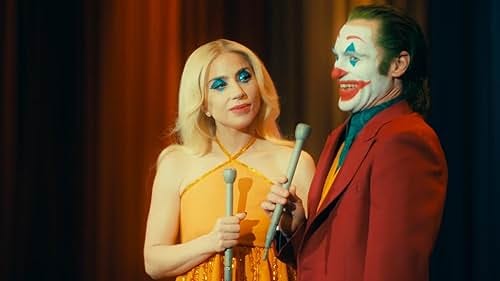When asked if Joker: Folie à Deux is a musical, director Todd Phillips told Variety, “Most of the music in the movie is really just dialogue. It's just Arthur not having the words to say what he wants to say, so he sings them instead.” This is essentially the textbook answer for the existence of musicals, so I was confused about the decision to back away from calling this film a musical. Still, after seeing it, I feel like I have a better understanding, though it isn't a point in the movie’s favor.
The film joins Arthur Fleck (Joaquin Phoenix), now in prison for his month-long murder spree. He is still rail-thin and the subject of abuse from the guards, with only flashes of kindness from Sullivan (Brendan Gleason), who will sometimes reward Arthur with a cigarette if he tells a joke. One day, when Arthur is being taken to meet his lawyer, Maryanne Stewart (Catherine Keener), he passes a room full of singers and is taken with Lee Quinzel (Lady Gaga). The two begin their frantic love affair just as Arthur is about to go to trial for his crimes.
I want to start by saying that there is not a bad performance in Joker: Folie à Deux. Gleeson is pitch-perfect in his role as the guard. Gaga continues to show her prowess as an actor on the big screen. And Phoenix displays even more nuance than he did in the original movie. This is a stacked cast, and even the bit players are fantastic.
Unfortunately, those excellent performances are layered on top of a paper-thin script. Whether you liked what Joker had to say or not, there is no denying that the movie had a thesis statement. In Joker: Folie à Deux, there are ideas that are put out there, but none are fleshed out in any kind of meaningful way.
The most interesting theme that the movie dances around (sometimes quite literally) is how we can sometimes elevate obviously monstrous people to positions of celebrity and create a following around them. Unfortunately, the best avatar for this is Lee, but she is never fleshed out in a way that allows us to fully understand her motivations.
This is where, if the film had been a proper musical, it could have followed this line better. Instead, the songs offer only the barest thread of continuity for the story. There are only two musical elements that elevate the film. If all of the rest had been removed, nothing about the story would be changed. What it does, however, is to slow the pace down to a glacial speed.
Ultimately, the title itself is a misnomer. “Folie à Deux” roughly translates to “shared madness.” The problem is the movie isn’t sure who is mad and who is sharing that madness. Is it between Lee and Arthur? Is it between Arthur and his followers? Unfortunately, it seems mostly to be between Phillips and us, thinking that there was more to Arthur’s story than we had already experienced.
This review originally appeared in The Dominion Post on September 6, 2024.






